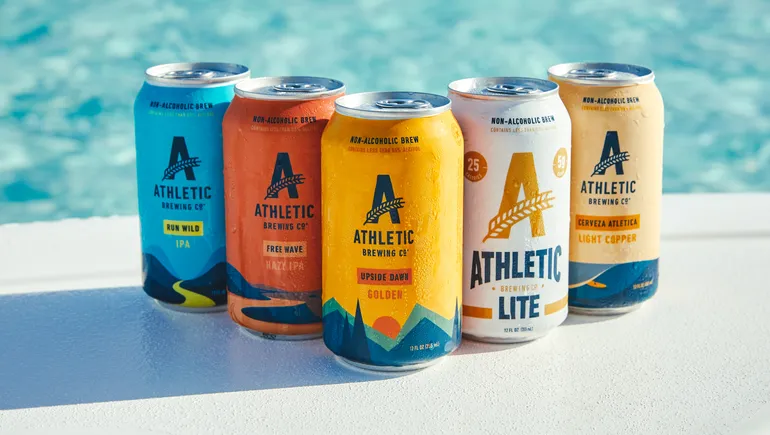Beer giants lifting nonalcoholic space with ‘non-compromising’ launches: Athletic CEO

Large beer companies have done a good job bringing their core offerings into the non-alcoholic space, providing further momentum for the fast-growing category, the CEO of Athletic Brewing said.
“Many of these flagship brands in our category are non-compromising to their alcohol counterparts and I think the category is on a really good footing,” Bill Shufelt, co-founder of the non-alcoholic beer maker, told Food Dive.
Just a half-decade ago, flagship brands were missing from the non-alcohol category. Now, nearly every brewer has one or more of their main offerings in the segment, including Molson Coors with Blue Moon, Diageo with Guinness, Constellation Brands with Corona, Heineken with its namesake brew and AB InBev with Bud Zero. Shufelt estimated there are 150 non-alcoholic U.S. brands.

Optional Caption
Permission granted by Athletic Brewing
Non-alcoholic beer accounted for just 0.3% of total beer category sales when Athletic launched in 2018; today it is around 1.5%, according to the company.
The beverage’s popularity is due largely to several factors, including new drinking occasions, a busy modern life for people and the importance of health. Athletic noted that more than 80% of its consumers still drink alcohol.
Retail sales of non-alcoholic beer were around $1.2 billion in the U.S. last year. Shufelt expressed optimism that non-alcoholic beer could eventually control up to 20% of the more than $100 billion beer category within the next decade.
Health and wellness trends are unlikely to abate, he said, and many retailers are slowly increasing the number of non-alcoholic options they carry. At some national retailers with 300-plus stores, non-alcoholic beer accounts for 20% of beer sales. He said outlets where sales are near zero or in the low single digits will eventually carry more non-alcoholic options, providing a further catalyst to the beverage.
“The leading indicators are pointing to a very big category,” Shufelt said.
Athletic has rapidly grown into the largest non-alcoholic beer company with a 20% share of the category. Off-premise dollar sales at the company surged more than 65% through March 23 compared to the same period a year earlier, according to NielsenIQ data.
Robert Ottenstein, a senior managing director and head of the global beverages and household products team with Evercore, said earlier this year that Athletic has “done a phenomenal job” with its brand, packaging and taste of its product. He praised the company for being “very disciplined and, I think, deliberate” with the products it has introduced.
At the same time, Athletic has benefited externally from growing consumer interest in health and wellness.
“Everything is kind of coming together for Athletic, and I think that one is going to be around for a long, long time,” Ottenstein told attendees at the Beverage Forum conference in May. “If Athletic came out 20 years ago, I’m not sure it would be as successful as it is today.”

Optional Caption
Permission granted by Athletic Brewing
Shufelt agreed. Along with health and wellness, social media and direct-to-consumer sales have provided catalysts for non-alcoholic beer that didn’t exist several years earlier. “It probably would have been too early 20 years ago,” he confessed.
Athletic has invested more than $100 million on its beer production since its founding. In June, it purchased a 107,000-square-foot facility in San Diego across the street from its existing brewery for an undisclosed sum. The new manufacturing plant will help the company double its capacity to brew its nonalcoholic beer.
Innovation also has been a key part of its strategy. The Connecticut-based company introduces about 50 new beers annually; most are sold online with the most popular selections making their way to retail. Shufelt said Athletic could eventually move into other non-alcoholic beverages beyond beer, but for now, it is focusing on its signature brews.
“While we have a ton of innovation ideas, just about anything takes away focus and resources … from our core,” he said.
Athletic’s success has attracted the interest of large beverage companies interested in purchasing the brewer, Shufelt noted. Its most recent funding round included a $50 million investment from Keurig Dr Pepper. But like most entrepreneurs, he dismissed talks of a deal and insisted he’s focusing on the long-term promise of the brand and the non-alcoholic category.
“All options are ours naturally,” Shufelt said. “It doesn’t make sense to close any doors, however. It’s kind of my life’s work. And I think the future is really big and exciting.”
Source: fooddive.com

